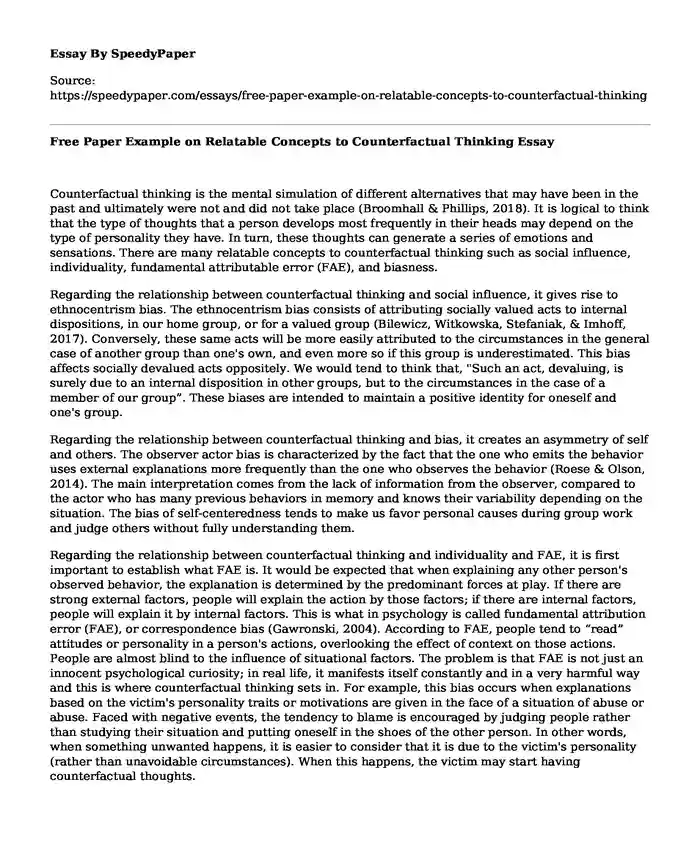
| Essay type: | Definition essays |
| Categories: | Social psychology Mental health Human behavior |
| Pages: | 3 |
| Wordcount: | 742 words |
Counterfactual thinking is the mental simulation of different alternatives that may have been in the past and ultimately were not and did not take place (Broomhall & Phillips, 2018). It is logical to think that the type of thoughts that a person develops most frequently in their heads may depend on the type of personality they have. In turn, these thoughts can generate a series of emotions and sensations. There are many relatable concepts to counterfactual thinking such as social influence, individuality, fundamental attributable error (FAE), and biasness.
Regarding the relationship between counterfactual thinking and social influence, it gives rise to ethnocentrism bias. The ethnocentrism bias consists of attributing socially valued acts to internal dispositions, in our home group, or for a valued group (Bilewicz, Witkowska, Stefaniak, & Imhoff, 2017). Conversely, these same acts will be more easily attributed to the circumstances in the general case of another group than one's own, and even more so if this group is underestimated. This bias affects socially devalued acts oppositely. We would tend to think that, "Such an act, devaluing, is surely due to an internal disposition in other groups, but to the circumstances in the case of a member of our group”. These biases are intended to maintain a positive identity for oneself and one's group.
Regarding the relationship between counterfactual thinking and bias, it creates an asymmetry of self and others. The observer actor bias is characterized by the fact that the one who emits the behavior uses external explanations more frequently than the one who observes the behavior (Roese & Olson, 2014). The main interpretation comes from the lack of information from the observer, compared to the actor who has many previous behaviors in memory and knows their variability depending on the situation. The bias of self-centeredness tends to make us favor personal causes during group work and judge others without fully understanding them.
Regarding the relationship between counterfactual thinking and individuality and FAE, it is first important to establish what FAE is. It would be expected that when explaining any other person's observed behavior, the explanation is determined by the predominant forces at play. If there are strong external factors, people will explain the action by those factors; if there are internal factors, people will explain it by internal factors. This is what in psychology is called fundamental attribution error (FAE), or correspondence bias (Gawronski, 2004). According to FAE, people tend to “read” attitudes or personality in a person's actions, overlooking the effect of context on those actions. People are almost blind to the influence of situational factors. The problem is that FAE is not just an innocent psychological curiosity; in real life, it manifests itself constantly and in a very harmful way and this is where counterfactual thinking sets in. For example, this bias occurs when explanations based on the victim's personality traits or motivations are given in the face of a situation of abuse or abuse. Faced with negative events, the tendency to blame is encouraged by judging people rather than studying their situation and putting oneself in the shoes of the other person. In other words, when something unwanted happens, it is easier to consider that it is due to the victim's personality (rather than unavoidable circumstances). When this happens, the victim may start having counterfactual thoughts.
Activation of counterfactual thoughts occurs when one fails to meet an established goal, and follows a pattern of reasoning that specifies what would have had to happen to accomplish that goal (Broomhall & Phillips, 2018). Thus, when faced with a negative result in a given situation, the counterfactual simulation of an alternative hypothetical scenario allows comparing different possibilities of the same event and establishing causal links that may be useful to face similar future contingencies. Playing through fictional scenarios triggers negative feelings in people, such as remorse for mistakes made.
References
Bilewicz, M., Witkowska, M., Stefaniak, A., & Imhoff, R. (2017). The lay historian explains intergroup behavior: Examining the role of identification and cognitive structuring in ethnocentric historical attributions. Memory Studies, 10(3), 310-322. https://www.researchgate.net/publication/318292129_The_lay_historian_explains_intergroup_behavior_Examining_the_role_of_identification_and_cognitive_structuring_in_ethnocentric_historical_attributions
Broomhall, A. G., & Phillips, W. J. (2018). Self-referent upward counterfactuals and depression: Examining regret as a mediator. Cogent Psychology, 5(1), 1416884. https://www.researchgate.net/publication/322569900_Self-referent_upward_counterfactuals_and_depression_Examining_regret_as_a_mediator
Gawronski, B. (2004). Theory-based bias correction in dispositional inference: The fundamental attribution error is dead, long live the correspondence bias. European review of social psychology, 15(1), 183-217. https://www.researchgate.net/publication/281179007_Fundamental_Attribution_Error
Roese, N. J., & Olson, J. M. (Eds.). (2014). What might have been: The social psychology of counterfactual thinking. Psychology Press. https://books.google.co.ke/books?hl=en&lr=lang_en&id=CD2ZAgAAQBAJ&oi=fnd&pg=PP1&dq=counterfactual+thinking+and+bias&ots=nqH1bT83RS&sig=_5drPVjPbKg8SIKN4lv6b-oQE6A&redir_esc=y#v=onepage&q=counterfactual%20thinking%20and%20bias&f=false
Cite this page
Free Paper Example on Relatable Concepts to Counterfactual Thinking. (2023, Oct 09). Retrieved from https://speedypaper.net/essays/free-paper-example-on-relatable-concepts-to-counterfactual-thinking
Request Removal
If you are the original author of this essay and no longer wish to have it published on the SpeedyPaper website, please click below to request its removal:
- Essay Example Discussing Access to Healthy Foods in Urban Communities
- Marketing Essay Sample on The Coca-Cola Company and Diet Coke
- Essay Sample: The Impact of GMO in Fifty Years' Time from Now
- Paper Example: Wanda's Supervisory Problem With Beverly
- Essay Sample on A Reflection Essay on Lesson Plan Implementation
- Childhood Obesity: A Comprehensive Analysis of Diagnosis, Risks, and Proactive Health Measures
- Essay on Navigating the Infodemic: Impact of Online Misinformation on Public Perception of the COVID-19 Pandemic
Popular categories




